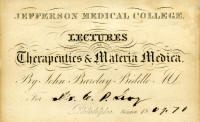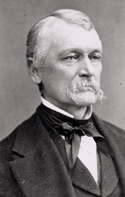John Barclay Biddle, M.D., 1815-1879.

Click on image to enlarge
Go to lecture card display
 Among the many physicians and
citizens of note who have died in Philadelphia since last autumn,
the name of John Barclay
BidDle holds a prominent position. Among the many physicians and
citizens of note who have died in Philadelphia since last autumn,
the name of John Barclay
BidDle holds a prominent position.
The writer of this memoir knew
him well; knew him as boy and man for more than fifty years. Our
knowledge of each other was more than a mere personal acquaintance;
it was, indeed, during several years, little short of a close
intimacy, an intimacy which had been transmitted to us through two
generations preceding our own; so that if the writer were to detail
what he knows of Dr. Biddle's entire life, the account would far
overrun the limits to which such an article as this should be
confined.
William Biddle, the first of Dr.
John B. Biddle's paternal ancestors in this country, emigrated from
the Old World to America about the year 1680, and settled in New
Jersey.
Passing over intervening years,
Dr. Biddle was born on the 3d of January. 1815. He was the eldest
son of Clement C. Biddle of this city; his mother was Mary, daughter
of John Barclay, a merchant of Philadelphia—one of those who made
the " Philadelphia merchant" a synonym of honor and integrity. Some
are still living who remember Mr. Clement C. Biddle as not only a
gentleman, but a man of high culture, a profound political
economist, honored in his immediate social circle, and highly
respected by those of inferior social status, with whom
circumstances called him to intermix.
Dr. Biddle's primary education
was one of the best; and after his boyish school days, he received a
thorough and elegant collegiate education at St. Mary's Roman
Catholic College in Baltimore, Maryland. After leaving this literary
college, he entered, as a student of medicine, the office of Dr.
Nathaniel Chapman, Professor of Practice, Institutes, and Clinical
Medicine, in the University of Pennsylvania. Having passed through
the regular term of pupilage under this distinguished teacher, and
having attended the prescribed courses of medical lectures at the
University, he graduated in the spring of 1836, as Doctor of
Medicine, at the age of twenty-one years.
After receiving his diploma, Dr.
Biddle served a term as resident physician in the Philadelphia
Hospital, Blockley, and afterward went to Europe, to avail himself
of the greater advantages then offered in the Old World for a more
thorough medical training, and made full use of the opportunities
there afforded to the pupil. After spending somewhat more than a
year in the pursuit of professional knowledge abroad, he returned to
Philadelphia, and, presently, in conjunction with Dr. Meredith
Clymer, established a medical journal entitled The Medical
Examiner, which soon became popular with the profession, and
which continued to be a successful and useful periodical for many
years.
In 1846, Dr. Biddle'was chosen
Professor of Materia Medica and
Therapeutics in the newly established " Franklin Medical College" in
Philadelphia. This institution was but short-lived, and after its
close Dr. Biddle assumed the same chair in the " Pennsylvania
Medical College." His reputation as an earnest, capable, and
convincing instructor was now an established fact.
In 1850 he married Caroline,
daughter of William Phillips, of this city, by whom he had six
children, two sons and four daughters. The eldest son is an
officer in the United States Navy, and the other is a graduate in
medicine.
Dr. Biddle did not limit himself
to the ordinary duties of his professorship, and to the practice of
his profession. He published, in 1852, a treatise on materia medica
and therapeutics, which attained a rapid popularity, not only among
the students for whom especially he prepared it, but among others
more or less remote from Philadelphia. This work had reached its
eighth edition before the author's death, and, in the last yeai-s,
was used as a text-book, in various parts of the United States, by
many who were not, and did not expect to be, recipients of the
author's oral instruction.
Dr. Biddle was elected, in June,
18(55, to the Chair of Materia Medica and Therapeutics in " The
Jefferson Medical College of Philadelphia," which was left vacant
by the death of Professor Thomas D. Mitchell, and which was next
vacated by the death of the subject of this memoir. He proved an
effective and popular teacher in this position, as he had already
shown himself to be, while holding the same chair in the colleges
above referred to. His bearing before his classes was dignified and
commanding; insuring alike the attention and the respect of his
auditors. His voice was clear and capacious, and his enunciation
thoroughly distinct, though generally his style of speaking was more
slow and studied than is usual among such as speak extempore.
Punctual to his hour, prompt in appearing in his place, graceful and
courteous in his manner, he taught—beyond the mere instruction of
his chair—precision in duty, and refined and gentlemanly deportment
to those who sat under his tuition. He was appointed Dean of the
Faculty in May, 1873, and by his caution in forming his opinions, by
the impartial justice of his decisions, by his promptitude and
accuracy in his official business, and by a true courtesy extended
to such as had need to confer with him, he generally gained the
reliance, and even won upon the regard, of those with whom he was,
in this position, brought into contact; though, occasion ally, his
decision and his action in what he deemed the course of right, in
cases where no appeal from his ipse dixit could be held,
would cause him to be considered as unduly dictatorial. In this
relation of Dean, he exhibited constant proof of the possession of
executive capacity of a very high order.
He was connected with, and
physician to, sundry public institutions for many years. He was
Physician to the Pennsylvania Institution for the Deaf and Dumb for
upwards of thirty years ; to the Girard College for Orphans for
nearly five and twenty years; and he was President of the Board of
Directors of the County Prison for more than twenty years. His long
terms of service in these institutions sufficiently endorse his
faithful performance of the duties
entailed upon him, as was still further shown by the resolutions
passed, after his death, by the authorities of the said
institutions.
He suffered for several years
from gout, which had, at length, materially crippled him. Yet,
often, when his couch should have been his resting place, his
lecture hour would find him in his position before the class, giving
no sign of his physical distresses, and fulfilling the duties of his
chair with—frequently—an unusual energy. His general health and
strength had been failing for some few years, perceptibly to those
who were in close communication with him, far more so in fact than
to himself. Indeed, he seemed to consider his weakness, to which he
would sometimes refer, as no more than the natural and necessary
consequence of advancing years, and of the varied duties which
rested upon him.
Dr. Diddle was attacked by his
last illness in the latter part of December, 1878. It opened in the
form of a low grade of pleurisy, from which he was slowly improving,
when suddenly peritonitis set in, without apparent cause, if we
except the general dyscrasy under which he had been laboring for
some time. Some four to five days after the onset of this formidable
malady, which was accompanied by severe and almost constant pain, he
passed quietly away from earth at 7 o'clock in the evening of the
19th of January, 1879.
|
|